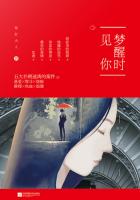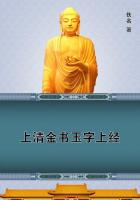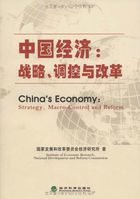"Even as on this side, thou seest that the boiling stream ever diminishes," said the Centaur, "I would have thee believe that on this other its bed sinks more and more, until it comes round again where it behoves that tyranny should groan. The divine justice here pierces that Attila who was a scourge on earth, and Pyrrhus and Sextus; and forever milks the tears that with the boiling it unlocks from Rinier of Corneto, and from Rinier Pazzo, who upon the highways made such warfare."Then he turned back and repassed the ford.
CANTO XIII. Second round of the Seventh Circle: of those who have done violence to themselves and to their goods.--The Wood of Self- murderers.--The Harpies.--Pier delle Vigne.--Lano of Siena and others.
Nessus had not yet reached the yonder bank when we set forward through a wood which was marked by no path. Not green leaves but of a dusky color, not smooth boughs but knotty and gnarled, not fruits were there but thorns with poison. Those savage beasts that hold in hate the tilled places between Cecina and Corneto have no thickets so rough or so dense.
Here the foul Harpies make their nests, who chased the Trojans from the Strophades with dismal announcement of future calamity. They have broad wings, and human necks and faces, feet with claws, and a great feathered belly. They make lament upon the strange trees.
And the good Master, "Before thou enter farther know that thou art in the second round," he began to say to me, "and wilt be, till thou shalt come unto the horrible sand. Therefore look well around, and so thou shalt see things that would take credence from my speech."[1]
[1] Things which if told would seem incredible.
I heard wailings uttered on every side, and I saw no one who might make them, wherefore, I, all bewildered, stopped. I believe that he believed that I believed that all these voices issued amid those stumps from people who because of us had hidden themselves.
Therefore said the Master, "If thou break off a twig from one of these plants, the thoughts thou hast will all be cut short." Then I stretched my hand a little forward and plucked a branchlet from a great thorn-bush, and its trunk cried out, "Why dost thou rend me?" When it had become dark with blood it began again to cry, "Why dost thou tear me? hast thou not any spirit of pity? Men we were, and now we are become stocks; truly thy hand ought to be more pitiful had we been the souls of serpents."As from a green log that is burning at one of its ends, and from the other drips, and hisses with the air that is escaping, so from that broken splinter came out words and blood together; whereon I let the tip fall, and stood like a man who is afraid.
"If he had been able to believe before," replied my Sage, "O woundedsoul, what he has seen only in my verse,[1] he would not upon thee have stretched his hand. But the incredible thing made me prompt him to an act which grieves my very self. But tell him who thou wast, so that, by way of some amends, he may refresh thy fame in the world above, whereto it is allowed him to return."[1] In the story of Polydorus, in the third book of the Aeneid.
And the trunk, "So with sweet speech dost thou allure me, that I cannot be silent, and may it not displease you, that I am enticed to speak a little. I am he who held both the keys of the heart of Frederick, and who turned them, locking and unlocking so softly, that from his confidence I kept almost every one.[1] Fidelity so great I bore to the glorious office, that I lost slumber and strength thereby. The harlot,[2] that never from the abode of Caear turned her strumpet eyes,--the common death and vice of courts,--inflamed all minds against me, and they, inflamed, did so inflame Augustus that my glad honors turned to dismal sorrows. My mind, in scornful temper thinking to escape scorn by death, made me unjust toward my just self. By the strange roots of this tree I swear to you, that I never broke faith unto my lord who was so worthy of honor. And if one of you returneth to the world, let him comfort my memory that yet lies prostrate from the blow that envy gave it."[1] The spirit who speaks is Pier delle Vigne, the Chancellor of Frederick II.; of low birth, he rose tathe first place in the state; he was one of the earliest writers of Italian verse. Dante has placed his master as well as him in Hell. See Canto X.
[3] Envie ys lavendere of the court alway; For she ne parteth neither nyght ne day Out of the house of Cesar, thus saith Daunte. Legende of Goode Women, 358*60.
A while he paused, and then, "Since he is silent," said the Poet to me, "lose not the hour, but speak and ask of him, if more pleaseth thee." Whereon I to him, "Do thou ask him further of what thou thinkest may satisfy me, for I cannot, such pity fills my heart."Therefore he began again, "So may this man do for thee freely what thy speech prays, spirit incarcerate, still be pleased to tell us how the soul is bound within these knots, and tell us, if thou canst, if any from suchlimbs is ever loosed."
Then the trunk puffed strongly, and soon that wind was changed into this voice: "Briefly shall ye be answered. When the ferocious soul departeth from the body wherefrom itself hath torn itself, Minos sends it to the seventh gulf. It falls into the wood, and no part is chosen for it, but where fortune flings it, there it takes root like a grain of spelt; it springs up in a shoot and to a wild plant. The Harpies, feeding then upon its leaves, give pain, and to the pain a window.[1] Like the rest we shall go for our spoils,[2] but not, forsooth, that any one may revest himself with them, for it is not just to have that of which one deprives himself. Hither shall we drag them, and through the melancholy wood shall our bodies be suspended, each on the thorn-tree of his molested shade."[1] The tearing of the leaves gives an outlet to the woe. [2] Our bodies, at the Last Judgment.















